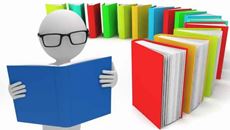- Delivery Method Online
- Professional Certificate
- 24hrs Suggested Study Time
- 3 Months Access
- Tutor Support
- Study On Any Device
- 4101 Students
Teaching Writing to Students

Get the professional development training you need to improve student literacy as an accomplished teacher shares the secrets of turning guided reading strategies into opportunities for teaching writing.
Around 30% of students in sixth grade already have trouble with basic reading and writing. These literacy problems affect performance across subject areas, and they often leave teachers wondering how to help. Get the professional development training you need to improve student literacy as an accomplished teacher shares the secrets of turning guided reading strategies into opportunities for teaching writing. The road to literacy is also the road to ingenuity, invention, and imagination, and you'll soon learn how to take your students from groans to grins with creative lesson plans that really work!
We'll start our journey by talking about the reasons reading and writing are so difficult for students. Then we'll meet the total literacy framework and see how it mitigates literacy problems once and for all. Since this framework is based on guided reading lessons that flow naturally into writing challenges, you'll learn the recipe for a successful guided reading into writing lesson.
Once the framework is in place, we'll investigate a number of ways to modify this basic recipe for a variety of K-12 circumstances, wrapping up with a look at good writing habits and the traits of a productive writing conference. If you're looking for the right way to get students excited about the power of literacy, this is the course for you!
Courses are delivered to you through expertly executed lessons, online instruction and interaction with like-minded students. Our courses are designed to deliver all of the benefits of studying in a classroom whilst giving you the flexibility to study at a time and place to suit your needs. You can access your classroom 24/7 from any device with an internet connection.
This course has a 3 month duration. You'll complete comprehensive lessons, quizzes and assignments before submitting your final exam at the end of the course to achieve your certificate. Courses must be completed within the 3 month access period.

Marsha Spears
A veteran educator who has taught every grade but third, Marsha Spears has spent 35 years teaching students and training teachers. Spears earned a bachelor's and master's degree in educational administration with a specialty in curriculum and lite... Read more
Read Marsha Spears's ProfileFrequently Asked Questions
The Learning Environment
From the moment that you enrol in the Teaching Writing to Students you will become an integral part of our learning community. You'll find yourself with the freedom to learn at a speed that suits you, on any device, from anywhere in the world. Achieving your career goals no longer has to mean compromising family and work commitments.
Ready to get started?
Enrol NowOur Values
Learn At Your Own Pace
We believe in personalised learning. That's why we provide all the tools and support you need to succeed at your own pace. With flexible learning, you'll stay motivated and retain more information. Plus, you can balance your studies with work and family commitments to make your dreams a reality.
We Won't Break The Bank
Education should be accessible to anyone who wants to learn. That's why we offer some of the most competitive prices in the industry with payments plans for just $25 per week. Investing in your future is a smart choice and doesn’t have to break the bank.
Industry-Led Courses
There's no better way to learn than from experts with years of experience in your field. That's why each of our 200+ industry-led courses are designed to give you a real-life perspective on your industry. With our expert mentors, you'll learn from people who have a wealth of knowledge and experience, and who are passionate about sharing it with you.
Get The Personal Support You Deserve
At Vibe Learning, we're real people who are dedicated to providing you with personal support every step of the way. Our industry experts are not only professional and knowledgeable but also incredibly passionate about sharing their expertise with you. With their guidance, you'll gain invaluable insights and practical knowledge to help you succeed.
Still looking?
Check out the following courses related to Teaching Writing to Students:



